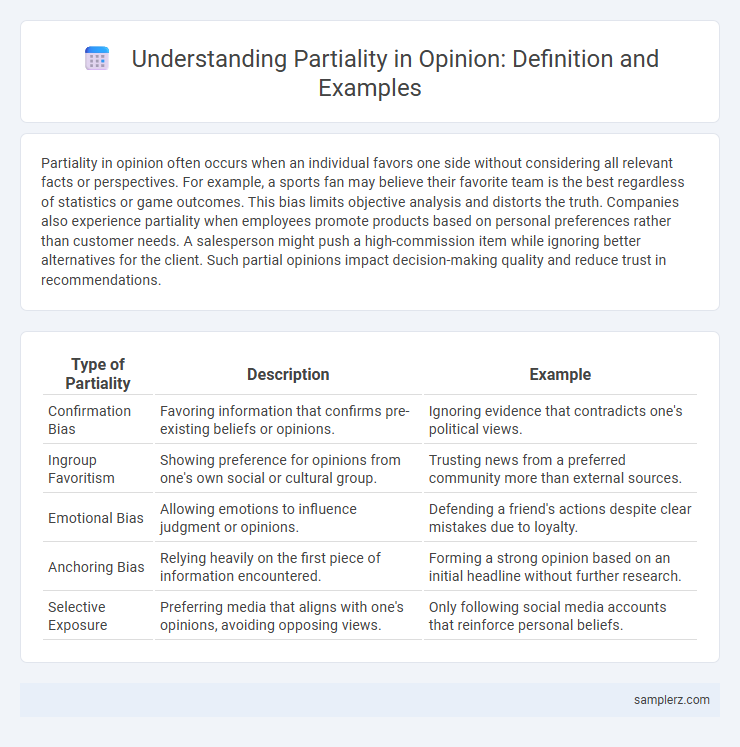Partiality in opinion often occurs when an individual favors one side without considering all relevant facts or perspectives. For example, a sports fan may believe their favorite team is the best regardless of statistics or game outcomes. This bias limits objective analysis and distorts the truth. Companies also experience partiality when employees promote products based on personal preferences rather than customer needs. A salesperson might push a high-commission item while ignoring better alternatives for the client. Such partial opinions impact decision-making quality and reduce trust in recommendations.
Table of Comparison
| Type of Partiality | Description | Example |
|---|---|---|
| Confirmation Bias | Favoring information that confirms pre-existing beliefs or opinions. | Ignoring evidence that contradicts one's political views. |
| Ingroup Favoritism | Showing preference for opinions from one's own social or cultural group. | Trusting news from a preferred community more than external sources. |
| Emotional Bias | Allowing emotions to influence judgment or opinions. | Defending a friend's actions despite clear mistakes due to loyalty. |
| Anchoring Bias | Relying heavily on the first piece of information encountered. | Forming a strong opinion based on an initial headline without further research. |
| Selective Exposure | Preferring media that aligns with one's opinions, avoiding opposing views. | Only following social media accounts that reinforce personal beliefs. |
Recognizing Partiality in Personal Opinions
Recognizing partiality in personal opinions involves identifying biases that stem from individual experiences, emotions, or cultural backgrounds which shape perceptions disproportionately. Awareness of these subjective influences is crucial for fostering open-mindedness and engaging in balanced discussions. Personal opinions often reflect partiality when they lack evidence-based support or dismiss alternative perspectives without consideration.
Common Examples of Biased Judgments
Biased judgments often manifest in hiring decisions where candidates with similar qualifications are favored based on personal similarities or stereotypes. In legal contexts, partiality surfaces when judges or jurors allow preconceived notions or external influences to sway verdicts, undermining fairness. Media coverage frequently exhibits partiality by selectively reporting information that aligns with a particular political agenda, shaping public perception.
How Social Circles Influence Opinion Partiality
Social circles profoundly shape opinion partiality by reinforcing shared beliefs and filtering alternative viewpoints through group norms. Exposure to homogeneous perspectives within close networks fosters confirmation bias, limiting critical evaluation of differing opinions. This social reinforcement creates an echo chamber effect, amplifying partiality and reducing openness to objective analysis.
Media Representation and Partiality in Opinions
Media representation often reveals clear partiality in opinions by selectively presenting information that supports a particular narrative or agenda. News outlets may emphasize certain facts while omitting others, leading to biased views that shape public perception and reinforce existing prejudices. This partiality undermines objective analysis and limits balanced understanding in societal discourse.
Family Ties: Favoritism in Everyday Views
Family ties often shape personal opinions, with favoritism influencing judgments in everyday situations such as sibling comparisons or parental approval. This partiality can lead to biased assessments, where relatives receive preferential treatment regardless of merit. Such favoritism distorts objective perspectives and affects decision-making within familial and social contexts.
Political Allegiance and Partial Perspectives
Partiality in opinion often manifests through political allegiance, where individuals favor viewpoints aligned with their preferred party, limiting exposure to diverse perspectives. This bias leads to partial perspectives, reinforcing echo chambers and hindering objective analysis of policies and events. Recognizing the impact of political allegiance on opinion formation is essential for fostering critical thinking and balanced discourse.
Workplace Partiality: When Opinions Favor Friends
Workplace partiality often emerges when opinions disproportionately favor friends, leading to biased evaluations and unfair advantages in promotions or project assignments. This favoritism undermines merit-based decisions, causing resentment among colleagues and diminishing overall team morale. Recognizing and addressing these biases is crucial for cultivating a fair and productive work environment.
Cultural Backgrounds Shaping Biased Opinions
Cultural backgrounds profoundly shape biased opinions by influencing how individuals interpret events, values, and behaviors through their unique social norms and traditions. These cultural lenses create partiality by prioritizing familiar perspectives while marginalizing or misunderstanding differing viewpoints. Such biases often manifest in judgment and decision-making, reflecting deeply ingrained societal and historical contexts.
The Role of Confirmation Bias in Forming Opinions
Confirmation bias significantly influences opinion formation by causing individuals to favor information that aligns with their preexisting beliefs, often disregarding contradictory evidence. This cognitive bias leads to partiality, as it reinforces subjective viewpoints and limits exposure to diverse perspectives. The entrenchment of confirmation bias in decision-making processes underscores its role in sustaining polarized opinions across social and political contexts.
Overcoming Partiality: Steps Toward Fair Judgement
Overcoming partiality requires conscious effort to recognize personal biases that skew judgment, such as favoritism toward familiar perspectives or selective information processing. Engaging with diverse viewpoints and critically evaluating evidence ensures a more balanced and fair assessment. Consistent practice of self-reflection and openness to challenge assumptions strengthens impartial decision-making skills.

example of partiality in opinion Infographic
 samplerz.com
samplerz.com